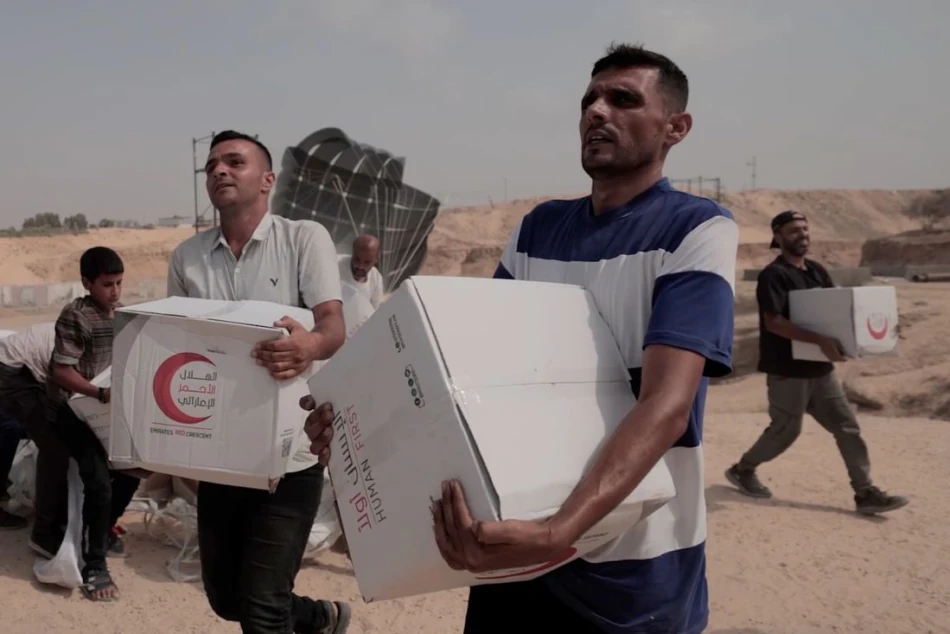
UAE Conducts 69th Aerial Humanitarian Airdrop, Delivers 500 Tons of Food Aid to Gaza
UAE Delivers 69th Airdrop to Gaza as International Coalition Expands Humanitarian Efforts
The United Arab Emirates has completed its 69th airdrop of humanitarian aid to Gaza, marking a significant milestone in what has become one of the most sustained international relief operations in recent years. The mission, conducted under the "Birds of Goodness" initiative within the broader "Gallant Knight 3" operation, now involves a growing coalition of European nations alongside Jordan, signaling deepening international commitment to addressing Gaza's humanitarian crisis.
Multi-National Coalition Takes Shape
The latest airdrop operation saw participation from Germany, Italy, Belgium, and France working alongside the UAE and Jordan. This expanding coalition represents a notable shift from earlier unilateral aid efforts, suggesting improved coordination among international donors and potentially greater diplomatic consensus on humanitarian intervention methods.
The involvement of major European Union members is particularly significant, as it demonstrates how the Gaza crisis has prompted traditionally cautious European nations to engage in direct humanitarian action. This mirrors similar coalition-building efforts seen during the Syrian refugee crisis, where initial bilateral aid programs gradually evolved into multilateral operations.
Scale and Scope of Relief Operations
The UAE's comprehensive approach combines both aerial and ground-based delivery systems. In addition to the latest airdrop, 20 trucks carrying approximately 500 tons of food supplies entered Gaza through land crossings, highlighting the country's dual-track strategy to maximize aid delivery despite logistical challenges.
The cumulative impact is substantial: total airdrops have now delivered over 3,924 tons of diverse humanitarian supplies, including food and essential materials. This volume places the UAE's Gaza aid program among the most significant humanitarian operations currently active globally, comparable to major UN World Food Programme interventions in conflict zones.
Strategic Implications for Regional Diplomacy
The UAE's sustained commitment to Gaza aid serves multiple strategic purposes beyond immediate humanitarian relief. The operation reinforces the Emirates' position as a regional humanitarian leader while demonstrating its capacity to coordinate complex international partnerships. This approach echoes the UAE's broader foreign policy strategy of building influence through soft power and humanitarian diplomacy.
The growing European participation also suggests potential for expanded diplomatic engagement on Middle Eastern issues, with humanitarian cooperation serving as a foundation for broader policy coordination. Similar patterns emerged during the Lebanese crisis of 2020, where humanitarian partnerships laid groundwork for subsequent diplomatic initiatives.
Operational Challenges and Innovation
The sustained nature of this operation—now at 69 airdrops—highlights both the severity of Gaza's humanitarian needs and the logistical complexity of maintaining such efforts. Airdrop operations require sophisticated coordination to ensure accuracy, safety, and efficient distribution, particularly in densely populated areas.
The UAE's ability to maintain this tempo while expanding the coalition suggests significant investment in operational infrastructure and diplomatic coordination mechanisms. This capability positions the Emirates as a key player in future international humanitarian responses, potentially rivaling traditional aid powers in terms of rapid deployment and sustained operations.
Broader Context of International Aid Architecture
The UAE-led initiative represents a notable example of middle-power humanitarian leadership, filling gaps where traditional international organizations face political or operational constraints. This model of coalition-building around specific crises could influence future humanitarian response frameworks, particularly in politically sensitive contexts where UN operations face limitations.
The success of this operation may encourage similar initiatives by other Gulf states or emerging donors, potentially reshaping the global humanitarian landscape toward more flexible, coalition-based approaches rather than relying solely on established multilateral institutions.
Most Viewed News

 Sara Khaled
Sara Khaled






